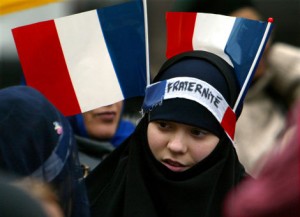Most Western European social scientists and policymakers believe that there is or should be a separation between church and state, religion and politics. They further believe that religion should be a private matter. This widespread assumption is often the basis for a sense that Muslims in Western Europe are making politically exceptional, culturally unreasonable, and theologically alien demands upon European states. These include the banning of offensive literature, cartoons, and films; the state funding of Muslim schools and Islamic instruction and worship in common schools; the accommodation of Muslim dress, diet, and gender segregation in public spaces such as schools and universities; Muslim organization and representation in political parties, trade unions, and professional associations; a question about religious observance on the national census and while collecting equality-monitoring data; and the sharing of the institutional, symbolic, and fiscal privileges enjoyed by Christian churches and Jewish organizations.
In fact, the ‘separationist’ self-image of Western Europeans with respect to religion and politics is quite mistaken. Every state in the European Union gives funding either to religious schools or for religious education in state schools, and over a third collect taxes or help raise money for (some) religions. Additionally, a third give funding to charitable religious institutions and one in five has ‘established’ state religions, like the Lutheran Church in Denmark and the Church of England in the United Kingdom.
In recognition of these existing institutional, fiscal, and symbolic linkages between state and religion, some political theorists have moved from defining political secularism as ‘separation’ to ‘state neutrality.’ Under this conception, the state must not privilege some religions over others but must instead treat them equally (e.g., in relation to funding for schools, within the House of Lords, or for state ceremonies). It must also not identify with any one of them, especially in relation to the law. A recent Quebec Government Commission, for example, proposed that the large cross in the Quebec legislature be removed, and that police officers and judges not be allowed to display their religious identity at work (such as by wearing a Sikh turban).
A strict policy of non-identification with a particular language, history, and culture, however, is impossible for a state to achieve. Moreover, to single out religion for non-identification is unfair to those for whom such identities are important. Rather, it is best to interpret state neutrality to mean that connections between state and religion must be inclusive, rather than push religious groups away. They must also, however, be consistent with liberal democratic constitutionalism.
What does this imply for Western societies’ secularist self-image? A minimal definition of political secularism, in which political authority does not rest on religious authority and the latter does not dominate the former, seems needed. Under this conception, each would have considerable, though not absolute, autonomy.
Beginning with this minimal definition, rather than with a stringent ideal, enables a better appreciation of the various forms of secularism. The mainstream Western European approach to secularism is best characterized as ‘moderate secularism.’ Moderate secularism sees organized religion not just as a private benefit but also as a potential public good or national resource which the state can, in some circumstances, assist to realize. However, the way this is institutionalized is quite different in moderate secular states such as Britain, Germany, and Denmark.
There is also a more radical secularism in European political culture, which is self-consciously exemplified in French laïcité. This form of secularism is less about accommodating religion than about maintaining a republican national space in which religion is not present while ensuring personal religious freedom outside the civic space. This civic space encompasses not just political and judicial institutions but also schools and, as far as some of its advocates are concerned, extends also to public culture, streets, parks, and shops.
How does this relate to the accommodation of Muslims? The above suggests that Western Europe may respond to Muslim political assertiveness in two opposing ways, based on its response to two controversies that erupted in 1989: the Rushdie affair in the United Kingdom and the headscarf affair in France.
In response to the former, realizing that Muslims were excluded from existing racial discrimination and incitement to racial hatred laws, the U.K. government started collecting data to map and respond to socio-economic inequality between religious groups. In due course, supplementary laws were created to bring religious equality in line with racial equality (the laws on both of these being the strongest in Europe and most likely to be enforced), and policies began to target Muslim disadvantage no less than racial disadvantage. The U.K. government sought interlocutors and partners amongst nationally and locally organized Muslims in order to identify and address legitimate grievances and, more generally, began to develop multi- and interfaith governance in order to express respect for religious communities and the importance of cohesion amongst them as well as in society generally. If Western European nations follow this example, they might allow Muslims to represent themselves in civil society, the media, and government at all levels, and encourage dialogue between religious groups and society. They might further treat religious discrimination and incitement to religious hatred seriously, and enforce the law through an agency (perhaps along the lines of the U.K. Equality and Human Rights Commission). Moreover, they might fund Muslim schools, bring Muslims into governance, and promote inter-faith relations at all levels, including in state ceremonies such as Remembrance Day.
Measures like this have been enacted in various European countries to differing degrees. Some, however, hav imitated the French response to the 1989 headscarf affair instead. Based on this example, some Western European nations have banned “ostentatious” religious insignia in schools and prohibited the wearing of face veils by adults in all public places. They have created a top-down national Muslim council as an interlocutor to the government, but this body only addresses a narrow religious agenda rather than political concerns or, alternatively, addresses a wide agenda without actuating policy (as in the case of the Islam Conference in Germany). Finally, too many European governments discourage Muslim self-representation in politics and civil society and prefer to initiate debates about Islam’s relationship to national identity in which Muslims are the objects of discussion rather than participants to it. This was the case for the French identity debate initiated by President Nicolas Sarkozy a few years ago.
It is clear that Western Europe will not be able to integrate its growing population of Muslims into its national polities without rethinking political secularism. This will be much easier where moderate secularism and multiculturalism prevail, as opposed to a more radical form of secularism. European nations must oppose radical secularism, antipathy to public religion, and the trampling and alienating effects this tendency is having on religious freedoms and a growing European Muslim population. Just as European citizens and governments must oppose the extreme nationalism that is asserting itself across the continent, they must also turn away from extreme secularism which, apart from in France, is not the Western European way. Affirming its historically moderate secularism, and adapting it to accommodate a multifaith national citizenry, represents Europe’s best chance for finding a way forward.


